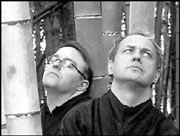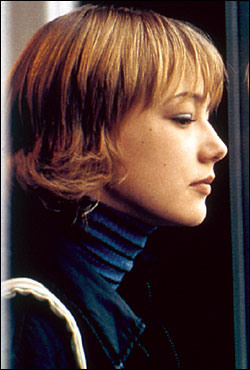ENLIGHTENMENT GUARANTEED
directed by Doris D�e with Uwe Ochsenknecht and Gustav-Peter W�r opens July 13 at Broadway Market
YOU TAKE DELIGHT where you find it during the summer movie season, although you might least expect it from a “little” German film about a pair of brothers in midlife crisis who set out for a Zen monastery outside Tokyo to find spiritual guidance. Yet Doris D�e’s Enlightenment Guaranteed is that delight: a sure-footed, poignant, ice-dry character comedy with a brilliantly matched pair of actors and an after effect as lasting as the sound of the monastery’s deepest, most reverberant bronze bell.
These Munich brothers are a particularly opposite pair. Rotund, bespectacled Gustav (Gustav-Peter W�r) is a feng shui consultant whose anxious clients hang on his every word. Beneath his wife’s chattering, Gustav meditates diligently, a practice his alpha male younger brother Uwe scorns. Kitchen salesman Uwe (Uwe Ochsenknecht) heads a handsome family whom we meet on a snowy Oktoberfest night, the kids in the glow of moon-faced paper lanterns, singing traditional songs. It’s deceptive: Ordinarily the kids’ boisterousness bugs Uwe; his sarcasm and passive-aggressiveness are unrelenting (“Look, children, Momma made a mess”), and his wife is ominously quiet. (Try to ignore the fact that Ochsenknecht looks eerily like a younger, taller Kelsey Grammer.)
Suddenly, all is kaput, and the abandoned Uwe dissolves into floods of astonishment and self-pity on his brother’s couch, drunkenly begging to come along on Gustav’s long-planned Buddhist retreat. (D�e hints at how well that might work as Uwe stabs out his cigarette in Gustav’s meticulously tended little Zen sand garden.)
Enlightenment’s heart rate gets a jolt in the Tokyo sequence that follows: The editing is sharp and crisp, and from the camera’s high angle above what seems to be Tokyo’s Times Square, the city is a plugged-in, purposeful anthill. Everyone is on a cell phone, walking at a wickedly fast clip, while a four-way crosswalk is a frenzied melee as everyone crosses at once.
TO BE LOST HERE, understanding not one word or street sign, is every traveler’s worst nightmare. Where an American director might use outward elements—robbery or other un-Japanese hazards—to set characters adrift, D�e builds from within. During the cumulative disasters that follow—voracious Hello Kitty ATM, $600 bar tab, white-gloved cab drivers who mistake “hotel” for “hospital,” then sudden separation—the brothers are thrown onto their inner resources.
To his own surprise, Gustav doesn’t crumple. The sight of him gallantly singing “I Will Survive” in German for spare yen in the subway is one of Enlightenment’s more triumphant moments. Uwe simply steals a tent and sets up housekeeping, creating a glowing orange beacon in a vacant lot. (That golden light brackets the film, front and back.)
Having, however inadvertently, left everything behind (except Uwe’s camcorder, to which they both confide), the two finally reach the monastery, where the movie’s pace slows as it glows visually. For an oasis of contemplation, this small retreat is hardly ever quiet. A young monk dashes pell-mell through the halls with a bell to wake the household before 5 a.m.; gongs, bells, and clappers mark every practiced ritual. It’s gorgeously hypnotic.
It’s also here that D�e’s nearly 30-year interest in the subtleties of relationships flourishes. (Recall 1985’s Men and 1998’s Am I Beautiful?) Paradoxically, Uwe does better with the spiritual rigors of the place. Meanwhile, Gustav, who has always expected perfection of himself, is wretched and uncoordinated, bringing out unexpected gentleness from his steely brother.
By the digital-video picture’s close, the brothers have reached a degree of mutual and self-acceptance, perhaps truly reflecting a monk’s words: “Don’t be so afraid of spilling a cup of tea that you don’t notice how warm the cup feels, how good the tea smells.”








